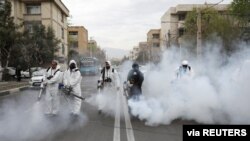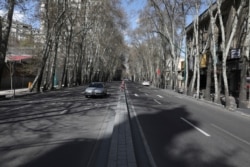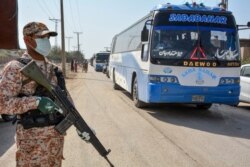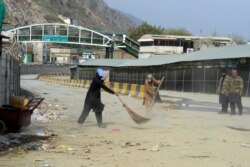Pakistan said Friday thousands of its nationals remain stranded in neighboring Iran, which also is battling the deadly coronavirus, and called for the lifting of international sanctions against Tehran to help stem the spread of the pandemic in the region.
Iranian officials say the virus has killed nearly 1,300 people in the country and infected more than 18,000 others in the past month.
Iranian Health Ministry spokesman Kianush Jahanpur tweeted Thursday that "50 new cases of infection are detected every hour and one death recorded every 10 minutes" in Iran, making it the third most affected country after Italy and China.
"I will insist on the international community to remove sanctions from Iran," Prime Minister Imran Khan told reporters in Islamabad. "It is extremely cruel that they [Iranians] are dealing with an outbreak at this massive scale and remain under International sanctions at the same time."
Earlier, Pakistani Foreign Minister Shah Mehmood Qureshi, in a statement Friday, described the situation in Iran as "dire."
"Sanctions must be lifted against Iran in this moment of peril so that it can use its resources to save precious human lives," Qureshi said. "We must, as leaders at time of such great challenge and difficulty, show utmost compassion."
Pakistan says the majority of its roughly 450 confirmed cases are Shi'ite Muslim nationals who returned home after traveling to religious sites in Iran.
Officials in Islamabad anticipate the number of COVID-19 cases increasing as hundreds of returnees from Iran remain in quarantine camps for suspected infections. About 5,000 people, including students, are due to return to Pakistan in the next few days.
"Thousands of Pakistanis are also stranded in Iran who need to be brought back home. So, we are requesting for the sanctions to be urgently lifted," Qureshi noted.
Pakistan has sealed its roughly 900-kilometer border with Iran for all human and trade movements.
Officials say Iranian authorities have ignored calls for holding back visiting Pakistani pilgrims, citing capacity issues in tackling the pandemic.
Critics note that crippling U.S. sanctions have hit hard an already fragile health care system in Iran, which suffers from shortages of medications and medical equipment. The Trump administration has rejected calls to remove sanctions during the pandemic.
Pakistan reopens Afghan border
Meanwhile, Pakistani Prime Minister Imran Khan has instructed authorities to reopen a major southwestern border crossing with landlocked Afghanistan for trucks transporting food and other essential commodities.
"Despite global pandemic of COVID-19, we remain committed to supporting our Afghan brothers & sisters … In time of crisis, we remain steadfast with Afghanistan," Khan tweeted Friday.
Pakistan also has closed all crossings at its nearly 2,600-kilometer border with Afghanistan, saying it would help prevent the coronavirus from spreading in the region.
Pakistani officials have reported three deaths from the coronavirus, but Afghans have reported none.
Afghan officials say they have detected roughly two dozen infections in the country, blaming them on returnees from Iran, host to hundreds of thousands of Afghan refugees and economic migrants.
Kabul says thousands of Afghans have returned home from Iran in recent days, raising fears the number of cases could spike.







